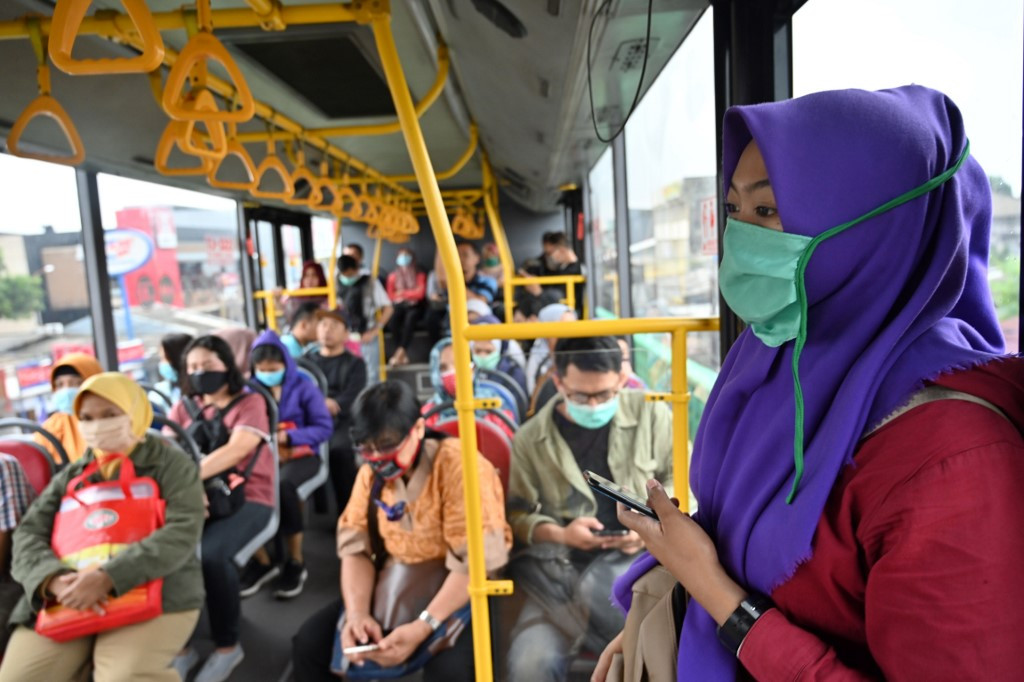Popular Reads
Top Results
Can't find what you're looking for?
View all search resultsPopular Reads
Top Results
Can't find what you're looking for?
View all search resultsIndonesian businesses look to Singapore, Malaysia for COVID-19 measures
President Joko “Jokowi” Widodo said on Monday that the government was “not leaning toward issuing a lockdown”.
Change text size
Gift Premium Articles
to Anyone
I
ndonesian businesses are looking at neighboring countries for coronavirus responses as Southeast Asia’s most populous country faces increasing pressure to escalate its own measures, including potentially locking down the economy.
The Jakarta Post spoke to three business leaders who said a Singapore-like response, where the government allows businesses and factories to operate, was more ideal for local enterprises instead of a full lockdown. The city-state has focused on tighter border control, contact tracing, social distancing and expanding healthcare services to mitigate the spread of COVID-19.
"The difference is that Indonesia is a big country, but we have to start with good virus testing protocols," Indonesian Employers Association (Apindo) deputy chairwoman Shinta Kamdani said on Thursday. “And Singapore is a good example.”
The Indonesian government is under pressure from both the World Health Organization and local communities to intensify its response toward the COVID-19 outbreak, particularly because the country’s largest annual holiday exodus, Idul Fitri, is just around the corner.
Read also: Investors question government’s transparency in handling COVID-19 crisis
Indonesia has so far responded by urging the public to practice social distancing, imposing temporary travel bans and shutting down schools in certain regions. On Thursday, President Joko “Jokowi” Widodo ordered mass testing in an effort to contain the spread of the disease after saying on Monday that the government was “not leaning toward issuing a lockdown”.
Singaporean National Development Minister Lawrence Wong, meanwhile, said on Tuesday that the government "was not planning" for a lockdown but also "can't rule it out".
Shinta went on to say that Apindo members had begun rolling out work from home (WFH) protocols, introducing limiting office density, reducing face-to-face meetings and assigning fewer work trips in helping mitigate the pandemic.
“WFH is mostly for administrative work. So, industries such as tourism, transportation and manufacturing are among those most affected yet not entirely able to execute WFH,” she noted.
Instead, factories have introduced other safety measures, such as compulsory body temperature checks, requiring employees to wear gloves and installing hand sanitizer dispensers.
Indonesian Food and Beverage Producers Association (Gapmmi) chairman Adhi Lukman said that a full lockdown — characterized by the closing of all shops, factories and transport hubs as implemented in Wuhan, China, in late January — would be problematic for local businesses.
“A lockdown would be burdensome for enterprises because […] we would still have to pay taxes, bank interest rates and employee salaries,” he said.
Read also: COVID-19: Does Indonesia need a lockdown? It depends on how you define it
Such expenses, he continued, would burden company cash flows even with several tax breaks introduced by the government to cushion the economic impacts of the virus.
Adhi also commended Malaysia’s “restricted movement” policy as a workable example for Indonesia. Malaysia allows certain factories, supermarkets and banks to run even though its borders, schools and non-essential shops, such as entertainment facilities, are being forcibly closed for two weeks starting on Wednesday.
In Indonesia, Adhi added that Gapmmi’s processed food supply was sufficient until June when most entrepreneurs expect the pandemic to die down. However, the association is experiencing shortages of locally sourced fresh produce such as sugar, beef, onion and salt.
Members have resorted to importing the commodities from Australia, New Zealand, Vietnam, Thailand and “a little bit from” Brazil, among other countries.
The State Logistics Agency (Bulog), which oversees the domestic food supplies, is similarly confident about rice supplies in Indonesia.
Bulog’s operations and public service director, Tri Wahyudi Saleh, said on Tuesday that the agency had 1.5 million tons of rice in stock. He added that Bulog planned to acquire another 1.2 million tons during the March-April harvest season.
“Our [rice] supply is safe until the end of the year,” he said as reported by kompas.com.
The Indonesian Chamber of Commerce and Industry’s (Kadin) deputy chairman for public policy, Raden Pardede, who is equally wary of a lockdown, emphasized that Indonesia could not fully copy Singapore’s response because it was an archipelago.
Read also: 'If not us, who else will do it?': Sweat and tears of Indonesia's COVID-19 nurses, doctors
“Indonesia is a much more complex country. We need mitigation staging and strategies. We can start by looking at the differences between the spread [of COVID-19] in Java and outside Java,” he said, noting that if the outbreak worsened in Java, other islands could serve as substitute supply chains.
The spread of COVID-19 has been more severe on Java Island, home to more than 90 percent of the country’s 309 confirmed COVID-19 infections as of Thursday, National Disaster Mitigation Agency (BNPB) data shows.
Vincent Harijanto, a member of the Indonesian pharmaceutical association GP Farmasi, said on Wednesday last week that policy relaxations were needed in ensuring industry continuity. He gave an example of the Indonesian Food and Drug Monitoring Agency (BPOM), which recently began accepting photocopies and emails instead of original documents to simplify drug import procedures.
“That is why we shouldn't say ‘businesses are locked down’ but that ‘businesses still have an opportunity for growth’,” he remarked.
Vincent estimated that GP Farmasi members had enough fast-moving pharmaceuticals to last through April and enough slow-moving stock until July, adding that Indonesia sourced around 85 percent of its raw pharmaceutical materials from China and India.










